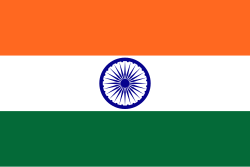| India at the 1970 Asian Games | |
|---|---|
 | |
| IOC code | IND |
| NOC | Indian Olympic Association |
| in Bangkok | |
| Medals Ranked 5th |
|
| Asian Games appearances (overview) | |
India participated in the 1970 Asian Games, held in the Bangkok, Thailand from December 9, 1970, to December 20, 1970. Indian athletes won total a 25 medals including six golds and finished at the fifth position in the medal's table. [1] [2]